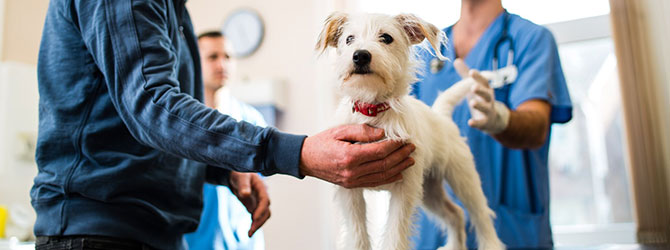Puppy Vaccinations: Keeping your Puppy Happy and Healthy
Protecting your new puppy against invasive, nasty and life-threatening diseases is integral to responsible pet ownership.
The best and most efficient way to protect your dog is to ensure they've been vaccinated against the most common canine diseases.
Brief Summary
- All puppies need to be vaccinated in order to help their under-developed immune system fight off infections
- Puppies will have at least two rounds of vaccinations and should receive a booster after a year
- Puppies should be vaccinated against parvovirus, leptospirosis, canine distemper, infectious hepatitis, and kennel cough
- The best way to protect puppies from these diseases is to ensure they are fully vaccinated
- Pets on preventative healthcare plans such as Pet Health Club receive vaccinations as part of their membership
Why are puppy vaccinations important?
When a puppy is born, their immune system is not developed enough to fight infections. However, nature helps them through their mother's milk as it contains colostrum.
What is colostrum?
Colostrum is a type of milk rich in antibodies which the mother produces in the first few days after birth. It gives the young puppies their mother's antibodies to fight off any infections and viruses while their immune system develops. After the first few days, this colostrum becomes regular milk, and the puppy no longer receives their maternal antibodies. How long these maternal antibodies will continue to give protection is variable. However, by 14 to 20 weeks (three to five months), the puppy must be able to rely on their own developing immune system.
This is where vet-administered vaccinations come in.
When do puppies get vaccinated?
Even if your puppy received milk bursting with antibodies, they don't last forever. These antibodies will begin to lose their potency after only a few weeks which is why it is so important to vaccinate your puppy. Vaccinations teach the immune system how to respond to a specific threat. Your puppy will receive a primary course of vaccinations consisting of two (or occasionally three) rounds of injections.
The ideal time for their first vaccination is between six and 10 weeks. The second set of vaccines will be administered around 3-4 weeks after this first dose, so by the time your puppy is 13 or 14 weeks old, they should have had both sets of vaccinations. In high risk areas, your pup may be advised to have a third vaccine.
How many vaccinations do puppies need?
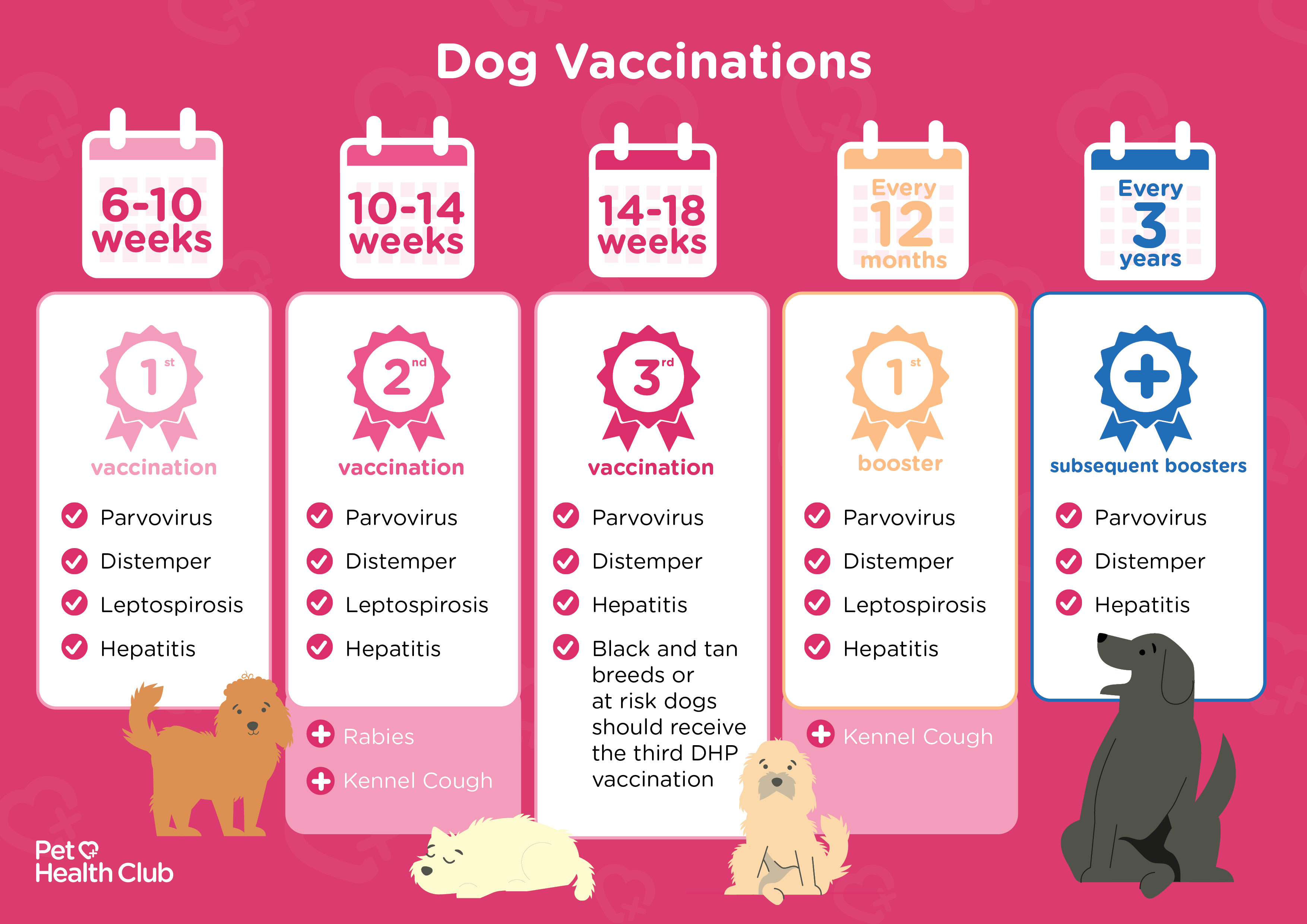
Your puppy should be vaccinated against the following as a matter of course:
- Parvovirus
- Leptospirosis
- Canine distemper
- Infectious hepatitis
- Parainfluenza/Kennel Cough
As your dog grows, they will need yearly boosters depending on numerous factors such as where you live, your dog's lifestyle and if they have any underlying health conditions.
Vaccinations statistics
- Around 93% of dog owners in the UK have vaccinated their pets against infectious diseases
- Labradors are the most commonly vaccinated breed in the country, followed by Cocker Spaniels and Staffordshire Bull Terriers
- One survey found 91% of UK dog owners believe in the importance of vaccinations for their pet
- Vaccination rates for dogs in the UK are steadily rising, with more than 80% of dogs receiving their primary vaccinations before 10 weeks old
Parvovirus
Parvovirus is a highly contagious virus that can spread through direct and indirect contact and can have devastating consequences if your puppy is infected. Young, unvaccinated, or incompletely vaccinated puppies are most at risk as the antibodies received from their mother begin to drop.
How is parvovirus spread between dogs?
Parvovirus is spread through saliva or poo from infected dogs. It can be transmitted through ingesting poop/saliva or from hands, feet, clothes, bedding and other objects that may have been inadvertently contaminated. Direct contact between dogs is not needed to spread the virus, and vigilance when socialising your puppy is paramount.
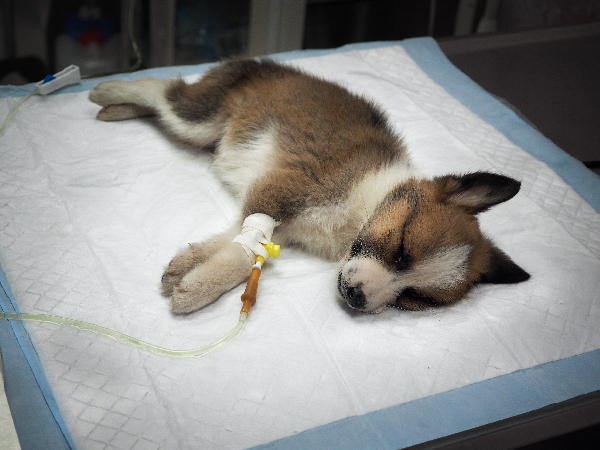
Parvovirus symptoms
If your puppy contracts the parvovirus, there is an incubation period of three to seven days before the first symptoms show. The virus affects the stomach and intestines, destroying the lining that helps absorb nutrients and acts as a barrier against bacteria and fluid loss. Some of the more common signs of parvovirus are:
- Bloody diarrhoea
- Vomiting
- Fever
- Lethargy
- Weight loss and loss of appetite
- Weakness
- Dehydration
Preventing parvovirus in puppies
The best way to protect your puppy from parvovirus is to ensure they are fully vaccinated against it. However, while waiting for the vaccination, following the advice about socialising your puppy is essential. You can carry your puppy out and about so they can get used to the big bright world, but be careful about what you introduce them to. Public areas, especially those with multiple dogs visiting such as dog parks and playing fields, must be avoided until at least a week after their second vaccination. Visiting houses and playing in a secure garden is OK, but make sure any other dogs you invite to meet and play with your pup have been fully vaccinated.
Parvovirus survival rate
Dogs seen by a vet in the first stages of parvo have a survival rate of up to 92%, and most puppies that survive the initial three-to-four days fully recover.
Leptospirosis
Leptospirosis is a bacterial infection, which can also spread to humans, when it is better known by its common name, Weil's Disease. It can be fatal. Most dogs are infected through direct contact with water or soil contaminated with urine from infected animals (often rodents). Therefore, it is primarily found in wet areas, especially stagnant water, and is often more prevalent after heavy rainfall.
The bacteria which causes leptospirosis usually enters your dog's bloodstream through their nose, mouth or open wounds, which is why it is important not to let your dog drink from puddles, canals and rivers. Once the bacteria enters the bloodstream, it can travel to the liver and kidneys, causing considerable damage. In extreme cases, it can lead to death.
Leptospirosis symptoms
General symptoms of leptospirosis are:
- Fever
- Yellow gums and eyes
- Muscle pain and limping
- Diarrhoea
- Mouth ulcers
- Vomiting
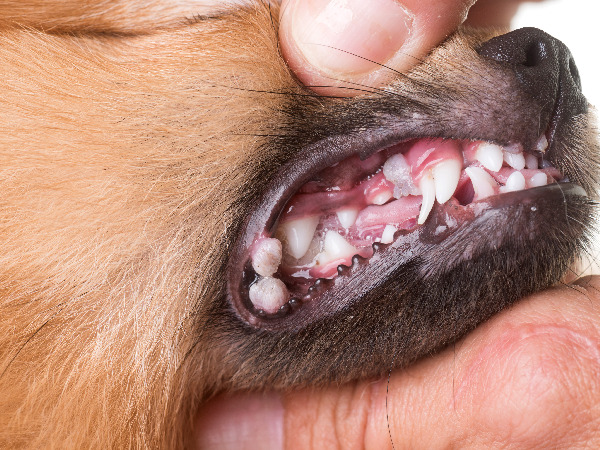
Leptospirosis treatment
Mild cases of leptospirosis are treated quickly with a course of antibiotics. Dogs who recover can still carry the bacteria for months after treatment, potentially spreading the disease. Ifleft untreated or undiagnosed, it can lead to irreversible and often fatal liver and kidney damage.
Canine distemper
Canine distemper is a highly contagious viral disease that affects multiple organs. It is often fatal, putting strain on the respiratory, nervous and gastrointestinal systems. Most canine distemper cases occur after a dog breathes in virus droplets from an infected dog, often from coughing or sneezing, but it can also spread through saliva, blood or urine.
Canine distemper symptoms
Symptoms in the initial stage can be hard to spot, especially in dogs or puppies halfway through their primary course of vaccinations. Some symptoms to look out for in the early stages are:
- Mucus discharge from the nose and eyes
- Coughing and sneezing
As the virus takes hold, it can go on to cause:
- Vomiting
- Diarrhoea
- Thickening of the paw pads (which is why the virus used to be called hard-pad disease)
- Neurological signs such as stiffness, muscle twitching, weakness or seizures
There is no specific treatment for distemper. If a healthy dog contracts canine distemper and it's caught in the initial stages, there is a good chance they will fully recover, but some dogs will have long-term effects such as seizures or limb paralysis
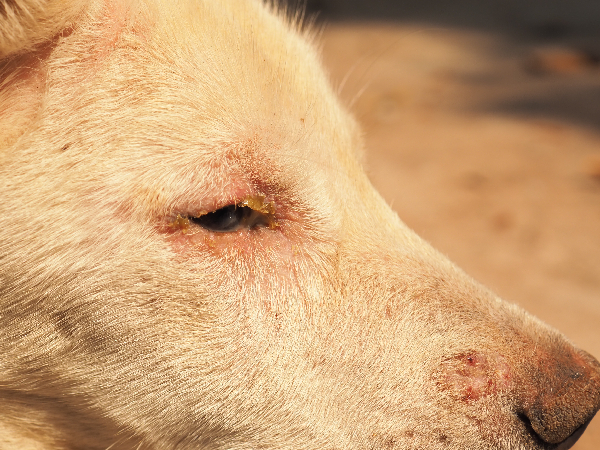
Canine distemper prevention
There are ways to help your dog not catch the virus in the first place. The top priority is to ensure your puppy is fully vaccinated against the virus and continues to receive their boosters. In addition, making sure shared surfaces such as food and water bowls are regularly disinfected will help kill the bacteria and prevent infection.
Infectious canine hepatitis
Infectious canine hepatitis, also known as canine adenovirus, is a viral disease that affects the liver, blood vessels, immune system, heart, eyes, lungs and kidneys. . As with many other transmittable diseases, canine hepatitis is spread through contact with bodily fluids such as saliva, urine and faeces. Those who become infected will usually show signs within 2 - 5 days, although it could be 14 days before symptoms appear.
Infectious canine hepatitis symptoms
Whether signs appear in four or fourteen days, we must know what to look for. Some clinical signs and symptoms of canine hepatitis include:
- Loss of appetite
- Lethargy
- Vomiting
- Diarrhoea
- Coughing
More severe cases may show pale or yellow gums, a painful tummy, weakness, bruising or bleeding and cloudy eyes. Sudden death is possible.
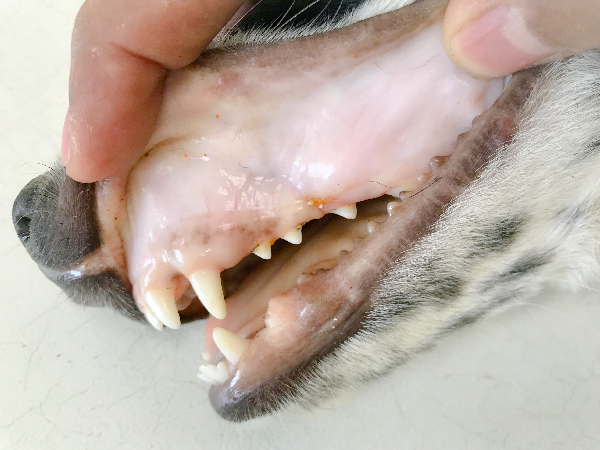
Infectious canine hepatitis treatment
There is no specific treatment for canine hepatitis, and antibiotics are not an option because it is caused by a virus. Instead, your vet will likely recommend intensive nursing, such as assisted feeding and fluid drip, which must be administered in a veterinary hospital. In severe cases, your puppy may need a blood transfusion.
A strong puppy with a mild case of hepatitis has a good chance of survival if treated swiftly. Those with more severe cases may die, or have to be put to sleep to end their suffering.
Kennel cough
Kennel cough is the term used to describe a number of respiratory infections where coughing is one of the significant clinical signs. It affects the trachea (windpipe), and is caused by several viruses or bacteria, often simultaneously. Because the infection is contagious and spreads rapidly when dogs are close to each other, it is often seen in kennels and boarding houses. It is called Canine Infectious Respiratory Disease Complex (CIRDC) in clinical circles.
Symptoms of kennel cough
Whilst it is often a mild disease, it can come with various symptoms, some lasting for weeks. The most common symptoms are:
- Loud, hacking cough often described as a 'goose honk'
- Runny eyes
- Fever
Some dogs will experience a lack of appetite or aversion to food because of swollen tonsils and harsh, scratchy throats.
Kennel cough treatment
Whilst there is no specific treatment for kennel cough, if it is bacteria based, then it can be treated with antibiotics. Some dogs may need supportive treatment such as anti-inflammatories if they are severely affected. Most infections resolve themselves in one to three weeks.
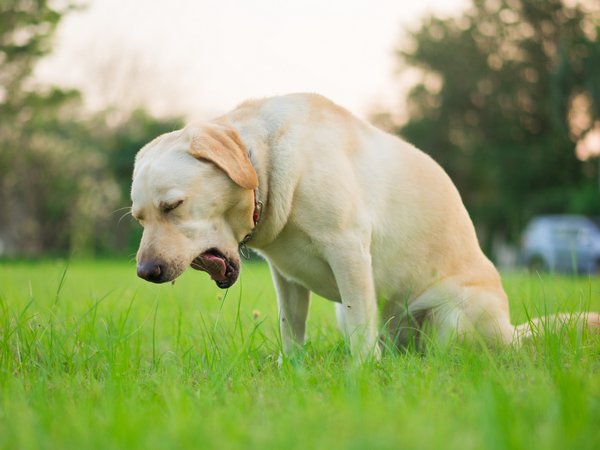
When can my puppy go outside?
If you have an enclosed and secure garden, you can take your puppy into the garden to learn to pee and to get used to their environment as soon as you bring them home for the first time. First, however, you must make sure no unvaccinated dogs have been in the area.
You must only let them play outside the house or walk in the street at least a week after their second injection. This extra time will help give your pup the additional immunity it needs to survive.
When can I take my puppy for a walk?
It’s always best to ask your vet and take their advice, but generally speaking, you will be able to take your puppy out for a walk 2 weeks after their second jab.
Unvaccinated puppies are susceptible to picking up viruses and infectious diseases, such as parvo and distemper, because they will spend lots of time sniffing and licking as they explore their surroundings.
When you have waited the length of time that your vet has advised, your fully vaccinated puppy can go outside and start socialising with other dogs. It's best to start with short trips, gradually building up to long walks.
What side effects can puppies get from vaccinations?
Because of the nature of vaccines and the fact that for them to work, puppies are given a little bit of the disease to prime those defences, your puppy may have some mild reactions to the vaccine. Whilst these reactions are usually mild and uncommon, it is important to be aware of things to look out for.
- Lethargy
- Loss of appetite
- Fever
- Localised swelling where the injection was given
How much do puppy vaccinations cost?
Like most things, the price will vary depending on where you and your dog or puppy live. Certain areas of the country are more expensive than others, and different veterinary practices may charge different prices. Vaccinating your puppy can come at a cost, but these aren't the same in every vet practice. In 2022 the cheapest vaccination, including kennel cough, was seen to be £44, with the highest being £122. The average sits somewhere around the £78 mark.
At My Family Vets, we recommend the Pet Health Club. You’ll get your puppy’s primary vaccine course, plus all their booster vaccinations for just £17.99 per month.
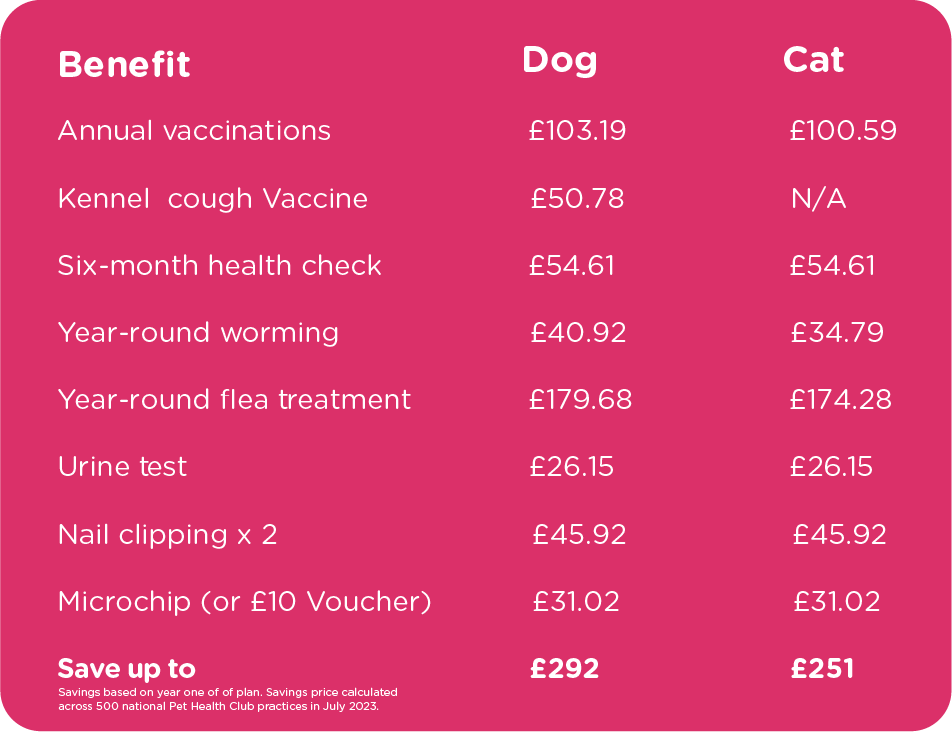
Membership also includes all your dog’s flea and worm treatment, a health check every 6 months, great discounts such as 20% off neutering, 10% off food, and much more.
Pet Healthcare Plans
Pet healthcare plans are subscription-based services that make it easier to pay for and receive preventative healthcare, such as vaccinations, fleas and worming and neutering, that your puppy will need to stay happy and healthy. Like everything in life, all healthcare plans will be different in some ways. The Pet Health Club is the only preventative healthcare subscription plan to offer vet-prescribed medication that cannot be bought over the counter. This gives you the peace of mind that your puppy will receive vaccinations, boosters, and other vet-prescribed preventative healthcare designed to keep your puppy happy and healthy for many years.
I’m travelling abroad. Will my dog need injections?
Before travelling abroad, your dog will need a pet passport or in some cases an Animal Health Certificate. To obtain a pet passport or an AHC, they'll need certain vaccinations.
Vaccinations required will depend on the country you plan to visit but in many cases, your dog will need a vaccination against Rabies. Always allow plenty of time for preparation before you travel, and speak to your vet well in advance.
Need more info?
If you’ve any questions about protecting your puppy or dog, just call or visit your local vet.
Find your nearest vet using our Find a Vet page, or speak to a vet online using Online Vets.
